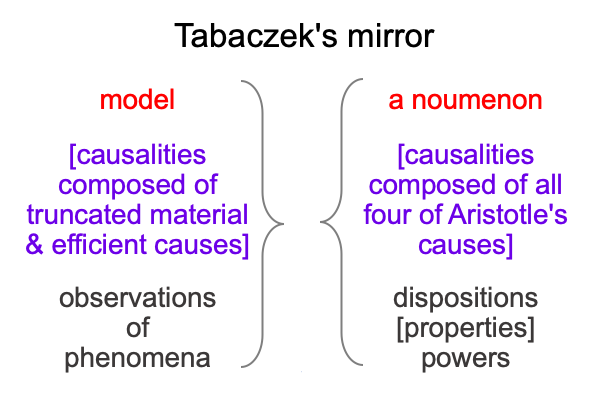0108 So, I ask, “Which side of Tabaczek’s mirror does team three belong?”

0109 Tabaczek quotes Nancy Murphy, a philosopher and theologian. In 1995, she quotes another philosopher and theologian, Austin Farrer, who, in 1957, says that, in emergent phenomena, constituents are caught, as if bewitched, by large patterns of action.
Using the motor driven by a hydrogen fuel-cell as an example, I repeat. An electrical current catches constituents that manipulate the combustion of molecular hydrogen and molecular oxygen, as if the chemical reaction is magically commanded to power a motor that will use and dissipate the energy of the current.
0110 Team two studies (or “reverse engineers”) the way that the electric current catches the constituents of the fuel cell that manipulates the combustion of molecular hydrogen and molecular oxygen.
0111 Team one investigates the way that a motor uses and dissipates the energy manifested by the current.
0112 In order to do their job, they practice the empirio-schematic judgment. They discuss their observations of their samples of the hydrogen fuel-cell driven motor and build models using causalities composed of truncated material and efficient causes.
0113 Here is the problem.
Discussions of researchers in teams one and two put analytical and earnest philosophers in a bind, because these scientists neglect the question, asking, “Why is corporation A making this fuel-cell driven motor in the first place?”, while at the same time conducting their research as if the positivist’s intellect is still alive.
0114 Plus, they think that team three are on the same side as teams one and two.
But, take a look at Tabaczek’s mirror (rendered above).
0115 To me, it seems that teams one and two are agents on the science side of the mirror.
Team three has agents on the philosophy side of the mirror.
But wait, these agents want to be on the science side of the mirror as well.
Which brings me to point 0002.
Consider a sentence, found on page 273 of Emergence, midway in the final chapter, seven, saying (more or less), “I hope that my re-interpretation of downward causation and emergent systems, in terms of old and new Aristotelianism, will help analytical metaphysicians sound more credible to scientists and philosophers of science, who employ, analyze and justify methodological reductionism.”
Hmmm.
